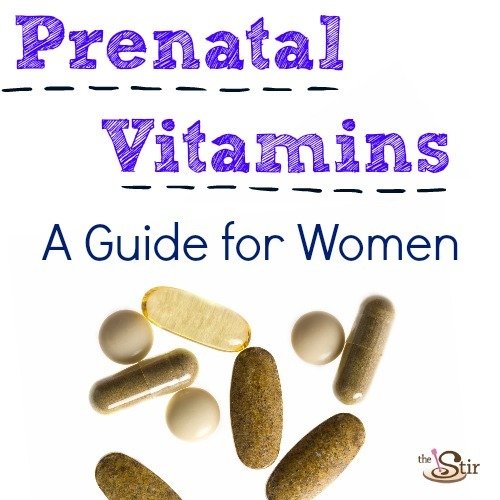If you're trying for a baby, you've probably hit your local pharmacy for a prenatal vitamin. Most OB/GYNs will tell women to start taking these supplements as many as one to three months before they're even pregnant! But which one do you choose? And are they even necessary?
"I do believe in a high-quality prenatal vitamin for every woman trying to build her family," says reproductive endocrinologist Dr. Josh Hurwitz with Reproductive Endocrinology at Reproductive Medicine Associates of Connecticut. The fact of the matter is that, try as we might, most of us don't get all of the essential nutrients out of our everyday diets, let alone all of the must-haves for a healthy pregnancy, so it's best to take a supplement.
More From The Stir: Get Pregnant Faster With These 9 Tips
So can you just grab any old bottle of vitamins? Not according to Hurwitz.
"The vitamin aisle often looks like the kids' cereal aisle, with various products competing to have the flashiest, fanciest packaging and the most 'natural' claims, and you could be getting a cheap product with a cool label," he warns.
For that reason, it's important to know exactly what to look for. Here, everything you should have and avoid in your prenatal vitamin of choice.

What to look for in a prenatal vitamin …
- The right amount of folic acid and nothing less. "One of the very few things there's a high level of evidence to support is on women taking folic acid ahead of trying to conceive," explains Hurwitz. This is because a deficiency of this vitamin could cause spina bifida, a neural tube defect that develops during the first month of pregnancy when the spinal column does not close completely. Research has actually shown that if all women who could become pregnant were to take a multivitamin with folic acid, the risk of neural tube defects could be reduced by up to 70 percent. That said, you'll want to look for a prenatal vitamin that has 800 to 1,000 micrograms of folic acid. And avoid prenatal vitamins that have folate, warns Hurwitz, as it has only about 60 percent the absorption in the body as folic acid.
- Enough iron. The right amount varies from person to person, based on their diet, but Hurwitz recommends finding a prenatal vitamin that has at least 28, if not 30, milligrams. That's because the need for iron in pregnancy doubles to accommodate separate maternal and fetal blood supplies.
- Enough calcium. Before, during, and after pregnancy, women should be getting 1,000 milligrams of calcium, which helps develop heart rhythm, blood clotting, circulatory, muscular, cardiovascular, and nervous systems. Plus, deficiency could put a mom at increased risk of osteoporosis.
- Vitamin D. Enough D will reduce your risk for preeclampsia and helps assist calcium and phosphorus in bone and teeth formation and density. Look for a prenatal that has 400 to 600 IU.
- Vitamin C. This antioxidant vitamin keeps sickness at bay by building a healthy immune system, and it also decreases preterm delivery risk. Shoot for at least 70 milligrams.
- Vitamin B6. This energy-boosting vitamin may help with morning sickness. You'll want 2.6 milligrams in your prental vitamin.
What to avoid in a prenatal vitamin …
- Gummy vitamins. Believe it or not, there are gummy vitamins for adults — and even ones marketed for prenatal health. "These are popular, but they're poor quality, and they do not deliver the correct amount of nutrients required, so I don't recommend them," says Hurwitz.
- The wrong kind of vitamin A. You want to avoid retinol or retin A, as it can cause birth defects. Look for a multivitamin that has the vitamin in beta-carotene form, which is the safest before and during pregnancy. You'll do well to shoot for 4,000 to 5,000 IU in your prenatal vitamin.
- Additives. "Prenatal vitamins can be very irritating, because they're big, and they have a lot of nutrients packed into them, so you want a nice, clean vitamin," explains Hurwitz. This means no preservatives or dyes.
- Allergens. You may also want to check that the label reads gluten- or dairy-free, if you're sensitive to those common allergens.
- The promise of a "whole foods"-based vitamin. "A lot of multis will say the nutrients come from whole foods," notes Hurwitz. This doesn't necessarily mean it's better for you. These may also contain herbs (like dong quai or ginseng) that could be contraindicated during pregnancy.
- Caffeine. Some multivitamins actually have as much caffeine as a cup of coffee, notes Hurwitz. Obviously that's something a woman trying to conceive or expecting would do well to avoid!
When in doubt, consult with your health care provider about the best prenatal vitamin choice for you.
How did you choose your prenatal vitamin?
Images via © iStock/L_Pop; iStock.com/pkline




